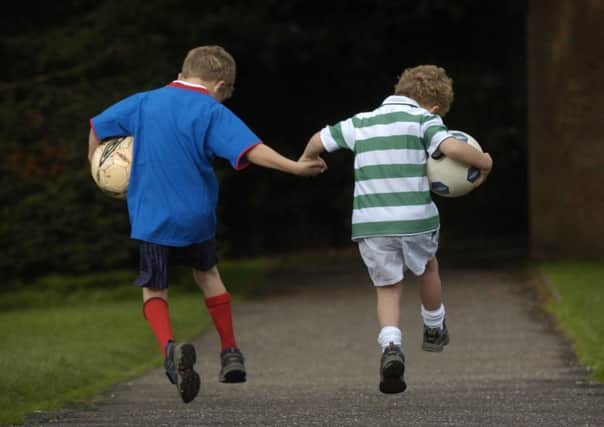Aiming to give children the best start in life


The Scottish Government has branded Scotland “the best place to grow up”.
What does that mean to children and young people in Scotland? For the most part, it will mean good services, like childcare and school; good opportunities to do exciting things like play sport, get involved in music or drama; good amenities locally and good transport links; having a warm house; and it will mean opportunities for work or further and higher education.
Advertisement
Hide AdAdvertisement
Hide AdAt a more basic level it will mean being safe, healthy, cared for and listened to.
For many of Scotland’s children, this sort of thing is taken for granted, but for others, these things do not form part of their experience at all.
Some children live with parents or carers who might need a bit of extra help to bring them up; some children are in the care system and rely on foster families, kinship care arrangements or residential care placements for their upbringing.
It is important, however, that we get things right for every child, no matter their circumstances and give them all the opportunities in life they deserve.
The Children and Young People’s Bill, currently at a crucial stage in the Scottish Parliament, will introduce changes that will help us achieve this for all children.
The first is an amendment to the Bill which will allow children and young people to stay in care until the age of 21 and return to care up to the age of 26. This is a groundbreaking commitment and positions Scotland as a world leader in terms of supporting vulnerable children in the care system.
Most young people in Scotland do not leave home until they are around 24 years old. Yet, for children and young people who have grown up in the care system, we expect in many cases that they should be able to live independently and, for example, manage their tenancy, job, and their finances along with many other things when they are just 16.
These young people have not had the best start in life anyway, yet we expect them to cope with far more on their own than we would expect other young people to be able to deal with from the background of a more secure up-bringing and the benefit of ongoing family support.
Advertisement
Hide AdAdvertisement
Hide AdNo one can take away the hurt and pain that comes with knowing that your own parents couldn’t or wouldn’t look after you, but we know that creating stable relationships for young people in the care system can make all the different in the world.
If a young person in care knows there is someone who knows them and cares for them and is interested in them – and that that person isn’t going to let them down, or drop out of their lives when they are just 16 – that can make all the difference in the world to them. That relationship can help young people maintain a tenancy, stick in at college, stay away from drugs and alcohol, keep out of prison, get a job and, crucially, form meaningful relationships of their own.
It’s no less than we’d want for our own kids.
The second part of the Bill that will help those of us who deliver public services target those services where they are needed most is the part that establishes a “named person” for every child in Scotland. This has been seen as controversial by some, while others have dubbed it “a social worker for every child” policy.
But that is exactly what it is not. Just the reverse in fact. Establishing a named person in the health service for pre-schoolers, and in schools for older children, is a way of avoiding the involvement of social workers where such involvement is not required. Most children and their families and carers will never need their named person and will remain unaffected by this change in legislation.
For those families that are struggling with some aspect of bringing up their child, the named person will be their contact and a conduit to getting the services or support they need.
For example, organising support across health and education for a disabled child might be confusing for a family not accustomed to the system. This is exactly the type of thing the named person can help with.
Having universal services, like education and health, work in this way can ensure that social work services target their support where it is needed most.
All of this is about creating the circumstances and environment to make sure that children in Scotland get the best start in life.
• Sandy Riddell is president of the Association of Directors of Social Work. www.adsw.org.uk
SEE ALSO